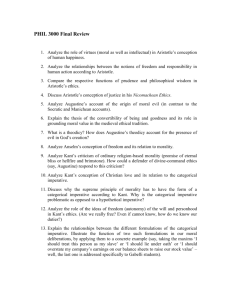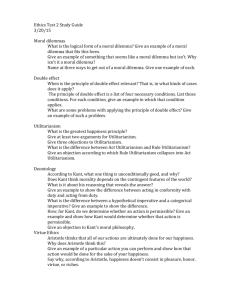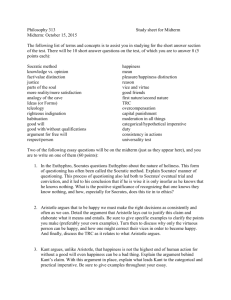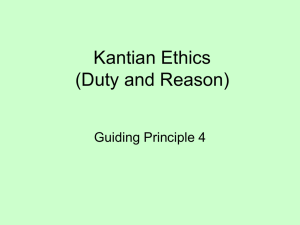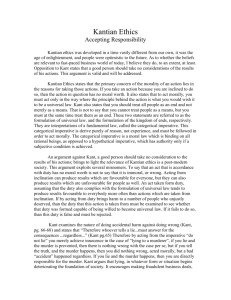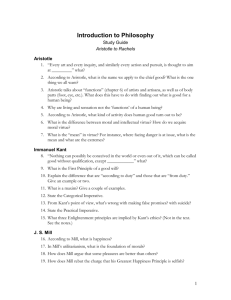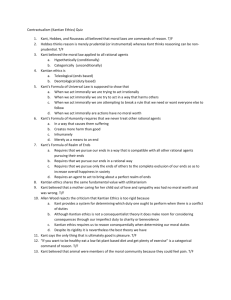On the incompatibility between Aristotle's and Kant's
advertisement
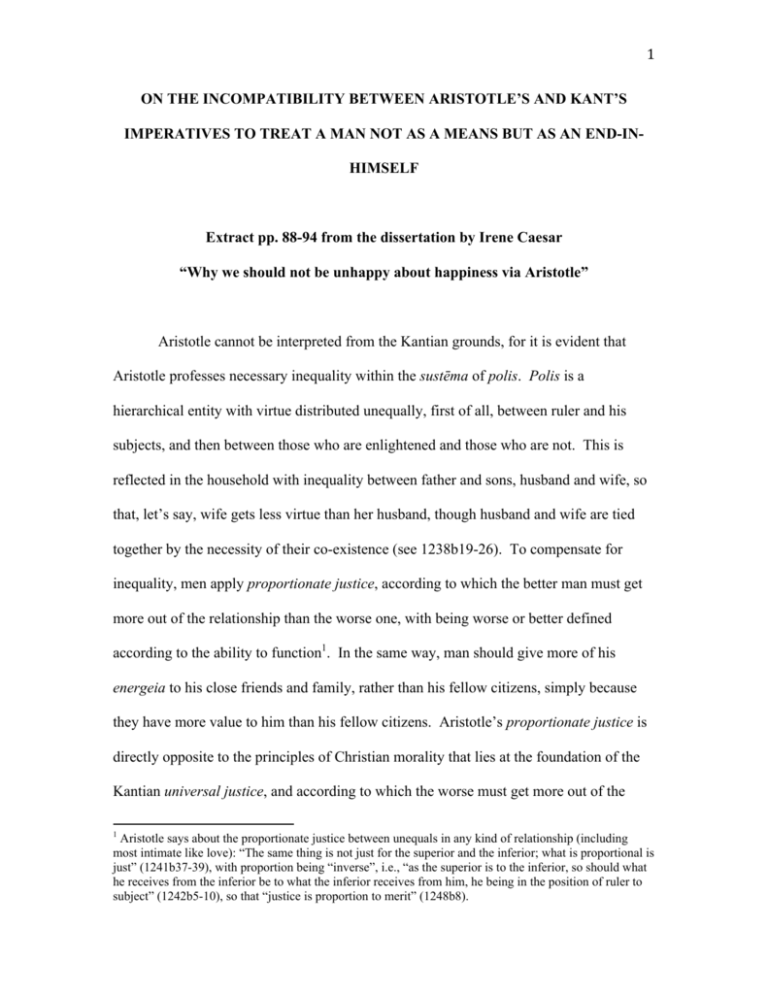
1 ON THE INCOMPATIBILITY BETWEEN ARISTOTLE’S AND KANT’S IMPERATIVES TO TREAT A MAN NOT AS A MEANS BUT AS AN END-INHIMSELF Extract pp. 88-94 from the dissertation by Irene Caesar “Why we should not be unhappy about happiness via Aristotle” Aristotle cannot be interpreted from the Kantian grounds, for it is evident that Aristotle professes necessary inequality within the sustēma of polis. Polis is a hierarchical entity with virtue distributed unequally, first of all, between ruler and his subjects, and then between those who are enlightened and those who are not. This is reflected in the household with inequality between father and sons, husband and wife, so that, let’s say, wife gets less virtue than her husband, though husband and wife are tied together by the necessity of their co-existence (see 1238b19-26). To compensate for inequality, men apply proportionate justice, according to which the better man must get more out of the relationship than the worse one, with being worse or better defined according to the ability to function1. In the same way, man should give more of his energeia to his close friends and family, rather than his fellow citizens, simply because they have more value to him than his fellow citizens. Aristotle’s proportionate justice is directly opposite to the principles of Christian morality that lies at the foundation of the Kantian universal justice, and according to which the worse must get more out of the 1 Aristotle says about the proportionate justice between unequals in any kind of relationship (including most intimate like love): “The same thing is not just for the superior and the inferior; what is proportional is just” (1241b37-39), with proportion being “inverse”, i.e., “as the superior is to the inferior, so should what he receives from the inferior be to what the inferior receives from him, he being in the position of ruler to subject” (1242b5-10), so that “justice is proportion to merit” (1248b8). 2 relationship with the better man than the better man himself. This Christian principle of equality via compensation is mostly categorically expressed in a Christian belief that the most poor in spirit reap the most lavish rewards in heaven. Unlike Christianity, Aristotle supports Plato in believing in the attraction of like to like. The better one is, the more good he attracts, and, even more important, the more good he deserves. This is an organic vision of cosmos as a living organism, in which functional parts remain, while dysfunctional parts do not, getting atrophied and rudimental. NE 9, 3 gives a detailed discussion of why the rejection of the dysfunctional friend necessarily happens after he falls in his value. Man should not love his brother / friend unconditionally (as Christianity demands), and ought to help him only to a certain degree conditioned by (1) whether the friend is curable from his evils (1165b18-20) and (2) by our non-alienable right to stay away from misfortune. In NE 9, 11, Aristotle admits that “men in adversity need help” (1171a23) and “grief is lightened when friends sorrow with us” (1171a30), but, he claims, “to see [a friend] pained at our misfortunes is painful; for every one shuns being a cause of pain to his friends”. “For this reason”, concludes Aristotle, “people of manly nature guard against making their friends grieve with them” (1171b5-8). Respecting the right of every man to be safe from suffering, we should “summon [our friends] to our bad fortunes with hesitation; for we ought to give them as little a share as possible in our evils” (1171b16-19). Thus, even when in need, good man should not pursue the maximization of his social interactions. On the contrary, the situation when we are in need, i.e., misfortune, requires from us to limit our social interactions, even with closest friends, in order to safeguard other people from our pain. 3 A manly man should be reluctant in imposing upon his friends a moral duty of either helping him or consoling him. This text is one of the building blocks in Aristotle’s powerful argument against Kantian categorical imperative to view any man as an end and not as a means and value him for his own sake, but, at the same time, to always sacrifice one’s happiness for the sake of moral duty. If moral duty demands, says Kant, an agent should forgo his happiness in order to help his brother. Though Kantian and Aristotelian imperatives have semblance – both profess2 the intrinsic non-alienable value of a human being3, this semblance is deceiving, because the Kantian imperative, in its subjection of personal happiness to the inter-personal and even impersonal moral duty, is the expression of Christian moral prerogative to love one’s brother more than oneself, and, ultimately, is the rejection of self-love for the sake of the higher power – “the goodness with which the world is governed”, “the idea that our existence has a different and far nobler end, for which, and not for happiness, reason is properly intended, and which must, therefore, be regarded as the supreme condition to which the private ends of man must, for the most part, be postponed” (Immanuel Kant, Fundamental Principles of the Metaphysics of Morals, First Section, trans. by Thomas K. Abbot, 1873). It is necessary to understand the crucial difference between two imperatives, for it is precisely the Christian imperative that urges to maximize one’s moral duty, viewed as sacred with all the virtues involved, to the point of denouncing one’s earthly life entirely for the sake of the reward in heaven. 2 Kant: “All rational beings come under the law that each of them must treat itself and all others never merely as means, but in every case at the same time as ends in themselves” (Immanuel Kant, Fundamental Principles of the Metaphysics of Morals, Second Section, trans. by Thomas K. Abbot, 1873). 3 Aristotle considers slaves to be slaves by nature, and, so, not a fully functional human beings. That is why slaves are not valued in themselves, and are simply the means for their masters. 4 Because Christian brotherly love is based on self-denial (Kant’s expression), the emphasis on loving one’s brother gets easily shifted to loving one’s enemy, for, from the point of view of self-denial, to love one’s enemy is more laudable than to love one’s friend. This doctrine is so incongruous with Aristotelian Ethics, to which Kant is much obliged, that, to apply it in his ethics, he directly turns, for the ultimate justification, to the Scripture, “in which we are commanded to love our neighbour, even our enemy, … even though we are not impelled to it by any inclination – nay, are even repelled by a natural and unconquerable aversion” (Ibid.). Commending a philanthropist who is “clouded by sorrow of his own extinguishing all sympathy with the lot of others” and, in general, a man who performs his duty remaining “cold and indifferent to the sufferings of others”, Kant claims that the estranged and cold-hearted philanthropy, with its repulsion and even unconquerable aversion to its objects, is of “a far higher worth than that of a goodnatured temperament” (Ibid.). Friendliness towards the objects of one’s beneficence, does, so to speak, pollute the goodness of a moral act, for “such actions be done from duty, not from inclination” (Ibid.). Evidently, the hateful and miserable philanthropist is an example of an agent who, for the sake of helping those whom he despises, and even his enemies, postpones his individual happiness. Essentially, the more repulsion does an agent overcome in helping his brother, the stronger and more commendable his good will is, the good will being simply the unconditional “respect for the law”, i.e., a priori, universal and categorical imperatives of morality: “In fact, the sublimity and intrinsic dignity of the command of duty are so much the more evident, the less the subjective impulses favor it and the more they oppose it; without being able in the highest degree to weaken the obligation of the 5 law or to diminish its validity” (Ibid., Second Section). Likewise, the misery of a dutiful man increases his moral worthiness, for, from the point of view of self-denial, to renounce oneself for the sake of duty when you most need to take care of yourself first simply to survive is more laudable than to perform one’s duty when you are not miserable. It is understandable that, because according to Kantian imperative, an agent does not and must not produce a specific intimate energeia of friendship towards the objects of his benevolence, he can increase their number indefinitely, to such a degree that he would ultimately prefer making impersonal donations to anonymous objects, rather than subjects, in a scheme. This thorough inhumane indifference towards people made into the objects of some superior benevolent order is what lies in the foundation of the maximization of virtue preached by Kantianism. Kant says: only “if we abstract from the personal differences of rational beings, and likewise from all the content of their private ends, we shall be able to conceive all ends combined in a systematic whole… that is to say we can conceive a kingdom of ends”4 (Ibid., Second Section). Only through the impersonality, Kantianism is capable of expressing the universality of its benevolence. And though Kant teaches that a kingdom of ends is within us, and so we are willingly, as free agents, should subscribe to its gross impersonal goodness, analogously to Christianity preaching that the divine kingdom is within us, one could indeed argue that it is this Kantian and Christian objectification of human beings, their complete unconditional subjection to the anonymous good of the many that is the foundation of the totalitarianism of fascism and communism. This ideological dynamics reveals the 4 In Hegel’s terms, Kantian imperative is opposed to Aristotelian imperative as the abstract universal is opposed to the concrete universal. 6 importance of the issue with the Aristotelian happiness understood by the majority of modern Anglo-American interpreters as the Kantian maximization of moral virtue. It points to the true significance of their incapacity to realize Aristotle’s opposition and even repulsion to the principles of Kantian ethics, and the necessity to finally resolve the issue. According to the Aristotelian ethics, this Kantian categorical imperative and the Christian view, in general, are self-contradictory. If in the relationship of two brothers, the first brother sacrifices his individual happiness to fulfill his moral duty towards the second brother, then only this second brother is treated as an end in himself and not as a means and valued for his own sake, while the first brother is treated as a means for the happiness of the second brother and valued not for his own sake but only as far as he is capable of living for the sake of his brother. Thus, this Kantian categorical imperative fails: it does not establish that a man should be valued only for his own sake, as an endin-himself, and never be treated as a means. It does not pass its own test of universality (i.e., that the requirement to treat everybody as an end-in-himself should be applied to both brothers, and to everybody else equally). And, so, Aristotle shows that when we mount upon our friends an excessive moral duty of, let’s say, grieving with us, we, in fact, by making them sacrifice their own individual happiness for our sake, convert them into our means and destroy our true friendship with them. Thus, making the individual happiness the highest good, Aristotle does necessarily claim for each individual his own personal space where only intimate friends are admitted and crowds are not allowed, and where even close friends cannot require of us the excessive moral duty that will transform us into a means for somebody’s happiness.

